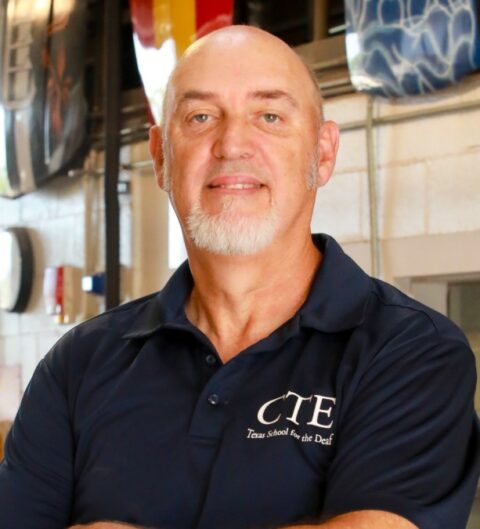“In my classroom, I want students to feel successful. I want to help them acquire skills and a work ethic that they can take back to their home communities.”
Keith Baker teaches Auto Collision Repair and Refinishing (ACRR) in the Career Technology Education program at the Texas School for the Deaf (TSD) in Austin. TSD’s CTE program is one of the largest in the country for deaf students, and all educators, including Baker, are deaf and communicate in sign language. As a boy in Oklahoma, he spent summers on a farm with his grandfather, working in the hay fields and fixing broken farm equipment, which helped him realize he was mechanically inclined and liked to work with his hands. He received his Bachelor’s of Science in Deaf Education and began teaching while attending graduate school. Baker’s hobby was restoring classic cars – and when the automotive position at TSD opened, he was hired and obtained his ACRR certification. He also has a Texas Teacher Certificate and I-CAR Certificate of Advanced Training. In 2006, his program was featured on an episode of Monster Garage – his team was challenged to and successfully built a running Rat Rod in five days (and in extreme heat).
Students come to TSD and Baker’s program often from public schools where they were the only deaf students and with limited connections to people fluent in sign language. Baker works to help his students feel successful and acquire skills they can take back to their home communities. His shop’s primary responsibility is serving customers who bring their cars for restoration work. They restore vintage cars and have also been working on food trucks, popular in Austin. Baker’s garages are specifically designed to be visually accessible and include ample space for students to work. He and his students can most often be found there, where he shares information about the vehicles they work on, including history, design, and challenges they might expect to encounter. Students meet with the customers, prepare work orders and understand the problem, then present the project to the rest of the class. Students learn many industry skills, including how to communicate with clients, negotiate fees, create work orders, order supplies, and complete a job to the customer’s satisfaction.
Many students who attend TSD have previously not been supported in their schools and communities. In addition, for two years during the pandemic students were forced to learn from online instruction, with little hands-on experiences. Returning to school has been a challenge after being at home for so long. The school makes students feel welcome and provides a safe environment for them to grow, learn, and become connected with the Deaf Community. The CTE programs offered are aligned with Texas standards, and curriculum adaptations and modifications help meet students’ learning needs. Students come to TSD from all over the state, and Baker helps them develop foundational skills to find employment or further training programs after graduation. His students participate in the Texas SkillsUSA statewide conference.
Baker strives to keep his garage up to date with the evolving standards and practices in refinishing and repair, to best provide foundational skills to his students. He also sees the challenges, which increased during the pandemic, of successfully communicating in an academic environment with his students. He uses identified best practices for language deprived students to help them focus and learn, ensuring there are ample opportunities for practice. Next year, he plans to find afternoon and summer opportunities for students to gain work experiences and to help employers see the value of having deaf employees. Baker hopes his efforts can encourage employers to become comfortable using communication technologies so that more deaf people can be employed and demonstrate they are a valuable part of the workforce, making career pathways more accessible.
“I believe former students would say that they learned how to live in the world as a deaf person, for example, how to access Vocational Rehabilitation Services, job placement programs, independent living programs, interpreting services, and they begin to learn how to advocate for themselves. They also would say that they started career exploration for work they might do in the future.”
